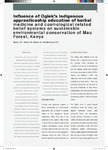| dc.description.abstract | Traditionally, the Ogiek are hunter- gatherers and have distinctive histories of interaction with the natural environment.Over the years, the Ogiek have inhabited in the Mau Forest with little impact on the environment. This paper critically examines the influence of Ogiek’s apprenticeship Scheme of herbal medicine and related cosmological belief systems and practices on sustainable environmental conservation of Mau Forest, Kenya. The study was informed by the General Systems Theory and the Cultural Ecology Theory. An ethnohistorical approach was employed in the design, instrumentation, data collection, analysis and interpretation. The paper reveals that herbal medicine as practised by the Pre-colonial Ogiek society facilitated the conservation of Mau Forest ecosystem for their sustainable livelihood. Similarly, basing an understanding on the cosmological belief systems and practices, it was revealed that it was the sacredness of the natural environment that became
a strong strategy in conserving Mau Forest ecosystem. Moreover, the omnipresence of God was cherished as the caretaker of the Mau Forest. Therefore, there was a strong moral conviction that the loss of Mau Forest and its biodiversity was a loss of the Ogiek heritage. It is hoped that the research findings will be useful to policy makers in such fields as education, medical Anthropology and environmental conservation on the need for the integration of indigenous knowledge systems into modern environmental management strategies | en_US |

